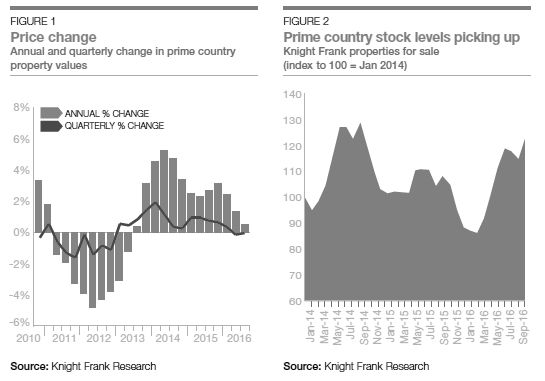Prime property prices were largely unchanged in the third quarter, falling by 0.1% over the three months to the end of September.
On an annual basis, growth remains positive at 0.5% – compared to the 1.8% dip seen in the prime London residential market – but notably slower than the peak of 5.2% in 2014. This moderation in price growth is largely a result of recent stamp duty increases being factored in to asking prices and offers.
While the headline figures suggest that the market has been relatively subdued, activity has remained resilient in the wake of the UK’s vote to leave the EU, with some leading indicators of activity remaining strong.
A 13% increase in new instructions between July and August compared with the same period of 2015, for example, means that stock levels across the prime market have started to tick up, an early sign that vendors, many of whom had delayed putting their homes on the market as a result of the referendum, are returning to the fray.
There was also a 7% increase in the number of properties going “under offer” over the same time.
However, our sales agents note that sensible pricing remains key, especially for properties valued above £1.5 million where the highest rate of stamp duty applies.
The strongest markets continue to be affluent towns and cities which have outperformed their more rural counterparts, although the differential has narrowed in the last 6 to 12 months.
Average values for properties in urban locations have risen by nearly 2% annually and are around 5% above the previous market peak. In comparison, annual price growth for rural properties was 0.5% and remains 12% below peak levels.
Prime urban markets benefit from good schools and amenities as well as excellent transport links to London, which make them among the first port of call for buyers from the capital.
Our figures show a 43% increase in the number of sales to Londoners in the Home Counties in the first nine months of 2016 compared with the same period the previous year.












